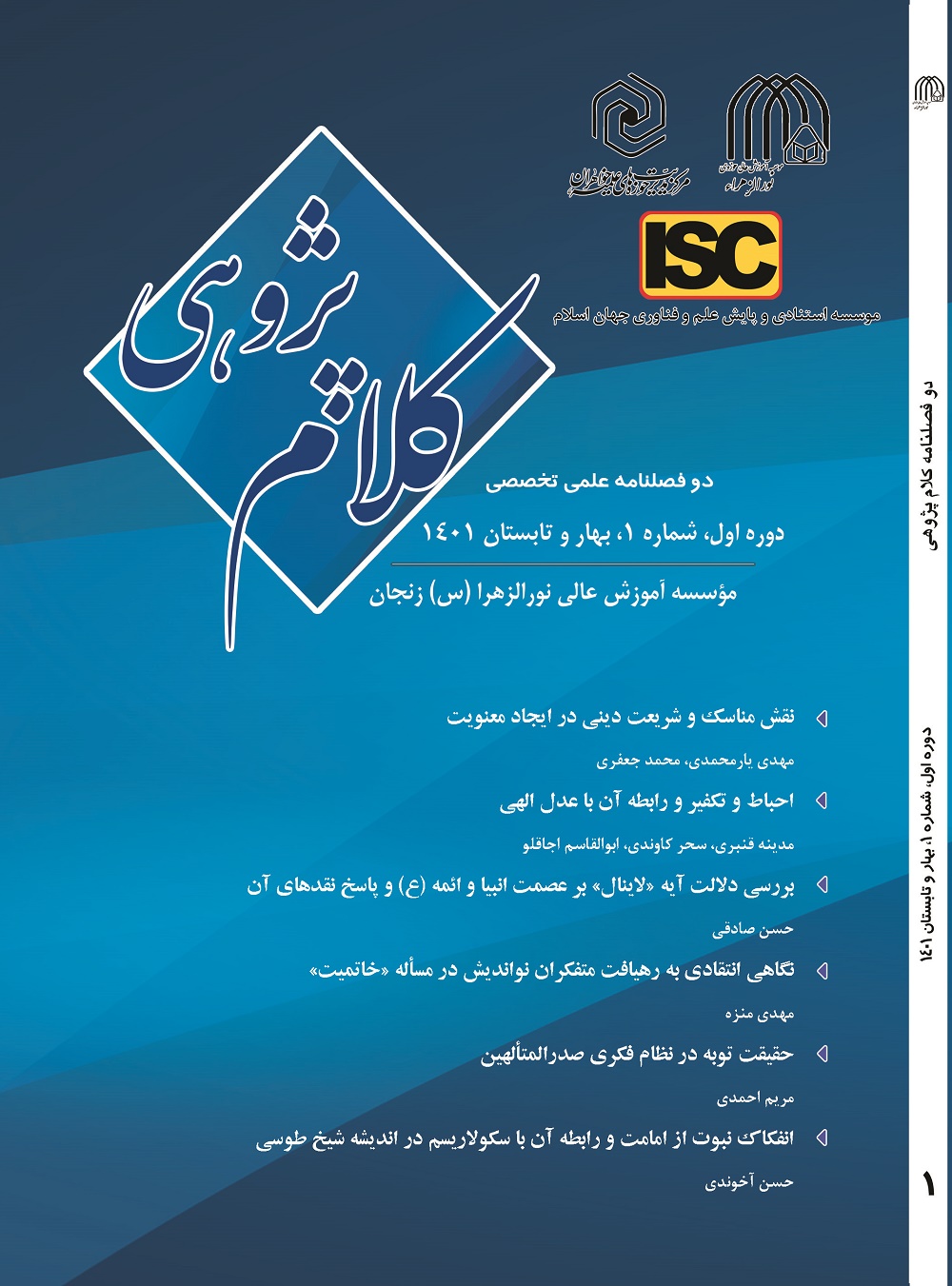نوع مقاله : مقاله پژوهشی
نویسنده
عضو هیات علمی گروه معارف دانشگاه آزاد اسلامی واحد نقده
چکیده
نوشتار حاضر درصدد است تا آموزهی «خاتمیت» را مورد بررسی قرار دهد. برای این منظور ابتدا رویکردهای مختلف به این مسئله را بیان کرده و در گام بعدی به تبیین انتقـادی رهیافت متفکران نواندیش در این حوزه میپردازد. از این میان، دیدگاه استاد مطهری درباره مسئلهی موردنظر، به دلیل تحلیل جامعی که بدست میدهد، مبنا قرار داده شده و به بررسی انتقادی آموزهی خاتمیت از نظر نواندیشانی همچون اقبال لاهوری، شریعتی و سروش میپردازد؛ سپس با ادلهی مختلف نقلی و عقلی به سراغ نقد این دیدگاهها رفته و نتیجه میگیرد که چنین رهیافتهایی، بهدلیل مخالفت با ضرورت دین و نصوص دینی و عقلانیت اسلامی، در فرهنگ اصیل اسلامی ره به جایی نمیبرد. در پایان نیز به ذکر چند شبهه پیرامون مسئلهی خاتمیت پرداخته و از زوایای مختلف، پاسخهای متناسب با آنها ارائه شده است.
کلیدواژهها
عنوان مقاله [English]
A critical look at intellectual thinkers’ approach to the question of “seal of the prophethood”
نویسنده [English]
- mahdi monazzah
عضو هیات علمی گروه معارف دانشگاه آزاد اسلامی واحد نقده
چکیده [English]
The present article is aimed at examining the doctrine of “seal of the prophethood”. To this purpose, initially different approaches to this issue are discussed and then intellectual thinkers’ approach is critically elucidated in this area. Motahhari’s point of view is taken as the benchmark since it gives a comprehensive analysis of the issue. The doctrine of “seal of the prophethood” is examined critically from the perspectives of intellectual thinkers such as Muhammad Iqbal, Shariati, Soroush. Next, numerous rational and revealed arguments are employed to scrutinize these perspectives. It is concluded that such approaches are destined to fail in authentic Islamic culture due to their objection to the necessity of religion, the exact religious texts, and Islamic rationalism. In the end, a number of misconceptions about the question of seal of the prophethood are mentioned and relevant responses are presented from various angles.
قرآن کریم
- نهجالبلاغه، ترجمه محمد دشتى، قم، انتشارات پارسایان، 1379.
- آلوسی بغدادی؛ تفسیر روح المعانی، ج3، بیروت، دارالفکر، بیتا.
- ابن فارس، احمدبن فارس، معجم مقاییس اللغه، ج2، قم، مکتب الاعلام الاسلامی، 1404ق.
- ابن منظور، محمد بن مکرم، لسان العرب، ج12، بیروت، دارالفکر للطباعه و النشر و التوزیع، بیتا.
- اچ.ترنر، جاناتان، مفاهیم و کاربردهاى جامعهشناسى، ترجمه محمد فولادى و محمد عزیز بختیارى، قم، انتشارات مؤسسه آموزشى و پژوهشى امام خمینى«ره»، 1378.
- اشراق خاوری، عبدالحمید، مائده آسمانی، ج4، تهران، مؤسسهی ملّی مطبوعات امری، 1350.
- اصفهانی، راغب، مفردات ألفاظ القرآن، بیروت، دارالشامیه و دمشق، دارالقلم،1416ق،
- اقبال لاهوری، محمد،احیایفکردینیدراسلام،ترجمهاحمدآرام، تهران، کانون نشر و پژوهشهای اسلامی، بیتا،
- البخارى، محمد بن اسماعیل،صحیح البخارى، ج4، بیروت، دارالفکر، 1411ق.
- پترسون، مایکل و دیگران، عقل و اعتقاد دینی، ترجمه ابراهیم سلطانی و احمد نراقی، تهران، طرح نو، 1388.
- جوادی آملی، عبدالله، شریعت در آینه معرفت، تهران، نشر رجا، 1372.
- جوادی آملی، عبدالله؛ تفسیر موضوعی (سیرة رسول اکرم در قرآن)، ج 8، قم، اسراء، 1379.
- جوادی آملی، عبدالله؛ منزلت عقل در هندسهی معرفت دینی، قم، اسراء، 1386.
- حلی، حسن بن یوسف، کشف المراد، قم، جامعه مدرسین، 1416ق.
- الحویزی؛ عبدالعلی جمعة العروسی، تفسیر نورالثقلین، ج4، قم، اسماعیلیان، بیتا،
- خمینی، روح الله، شرح چهل حدیث، تهران، موسسه تنظیم و نشر آثار امام خمینی، 1386.
- خمینی، روح الله، طلب و اراده، تهران، موسسة تنظیم و نشر آثار امام خمینی«ره»، 1383.
- خمینی، روح الله؛ آداب الصلوة، تهران، موسسه تنظیم و نشر آثار امام خمینی«ره»، 1384.
- دهخدا، علیاکبر؛ لغتنامة دهخدا، ج6، تهران، مؤسسه لغتنامه دهخدا(دانشگاه تهران)، 1377.
- رازی، ابوالفتوح، تفسیر روضالجنان، ج15، مشهد، بنیاد پژوهشهای اسلامی، بیتا.
- روشنی، روحی، خاتمیت، تهران؛ لجنه ملی نشریات امری و محفل روحانی بهائیان ایران، بیتا.
- سبحانی، جعفر؛ الالهیات، تلخیص علی ربانی گلپایگانی، قم، جامعه مدرسین، 1416ق،
- سروش، عبدالکریم، فربهتر از ایدئولوژی، تهران، مؤسسه فرهنگی صراط، 1376.
- سروش،عبدالکریم،مداراومدیریت، تهران، مؤسسهفرهنگیصراط، 1388.
- سروش، عبدالکریم؛ بسط تجربه نبوی، تهران، مؤسسه فرهنگی صراط، 1378.
- شریعتی،علی،مجموعهآثار،ج4 و14و30، بیجا، بیتا.
- الشیرازی، صدرالمتالهین(ملاصدرا)، الشواهد الربوبیة، قم، بوستان کتاب، 1382.
- طباطبایی، سید محمدحسین؛ المیزان، ج16، تهران، دارالکتب الاسلامیه، 1372.
- الطبرسی، فضل بن الحسن، مجمع البیان، ج4و8، بیروت، دارالمعرفة، بیتا.
- عبدالدائم، احمد بن یوسف، عمدة الحفاظ، ج1، بیروت، دارالکتب الاسلامیه، بیتا.
- العکبری البغدادی، محمدبن محمدبن النعمان(شیخ مفید)؛ النکت الاعتقادیة (مجموعهی مصنفات شیخ مفید«ره»)، ج10، قم، کنگره جهانی شیخ مفید، بیتا.
- العکبری البغدادی، محمدبن محمدبن النعمان(شیخ مفید)؛ اوایل المقالات، بیروت، دارالمفید، 1414ق،
- قیصری رومی، محمد داوود، شرح فصوص الحکم، به کوشش سید جلال الدین آشتیانی، تهران، انتشارات علمی و فرهنگی، 1375.
- کلینی، محمد بن یعقوب؛ الکافی، ج1، تهران، دارالکتب الاسلامیه، 1365.
- مازندرانی، فاضل، اسرارالآثار خصوصی، ج 3، تهران، موسسه ملی مطبوعات امری، 1346.
- مصباح یزدى، محمدتقى ، معارف قرآن(راهنماشناسى)، تدوین محمد سعیدى مهر، قم، مؤسسه آموزشى و پژوهشى امام خمینى«ره»، 1376.
- مصطفوی، سید حسن، التحقیق فی کلمات القرآن الکریم؛ ج3، تهران، انتشارات وزارت فرهنگ و ارشاد، 1416ق.
- مطهری،مرتضی،خاتمیت،تهران،انتشاراتصدرا،چاپ یازدهم، سال 1377.
- مطهری، مرتضی، مجموعه آثار، ج2و3، تهران، انتشارات صدرا، 1375.
- مطهری، مرتضى، مجموعه آثار، ج 21، تهران، انتشارات صدرا، 1381.
- مطهرى، مرتضى، مجموعه آثار، ج13، تهران، انتشارات صدرا، 1384.
- مغنیه، محمد جواد، تفسیرالکاشف، ج6، بیروت، دارالعلم للملایین، بیتا.
- مقرى بیهقى، ابوجعفر احمدبنعلى، تاج المصادر، ج1، تصحیح و تحشیه هادى عالم زاده، تهران، موسسه مطالعات و تحقیقات فرهنگى، 1366.
- مک کوارى، جان، تفکر دینى در قرن بیستم، ترجمه عباس شیخ شعاعى و محمد محمدرضایى، قم، انتشارات دفتر تبلیغات اسلامى، 1375.
- نسفی، عزیز الدین ؛ الانسان الکامل، تهران، طهوری، 1377.
- النیسابوری، مسلم بن الحجاج، صحیح مسلم، ج8، بیروت، دارالکتب العلمیه، بیتا.
- همیلتون، ملکم، جامعهشناسى دین، ترجمه محسن ثلاثى، تهران، انتشارات تبیان، 1377.
- هیک، جان، فلسفه دین، ترجمه بهزاد سالکی، تهران، انتشارات بین المللی الهدی، 1381.

